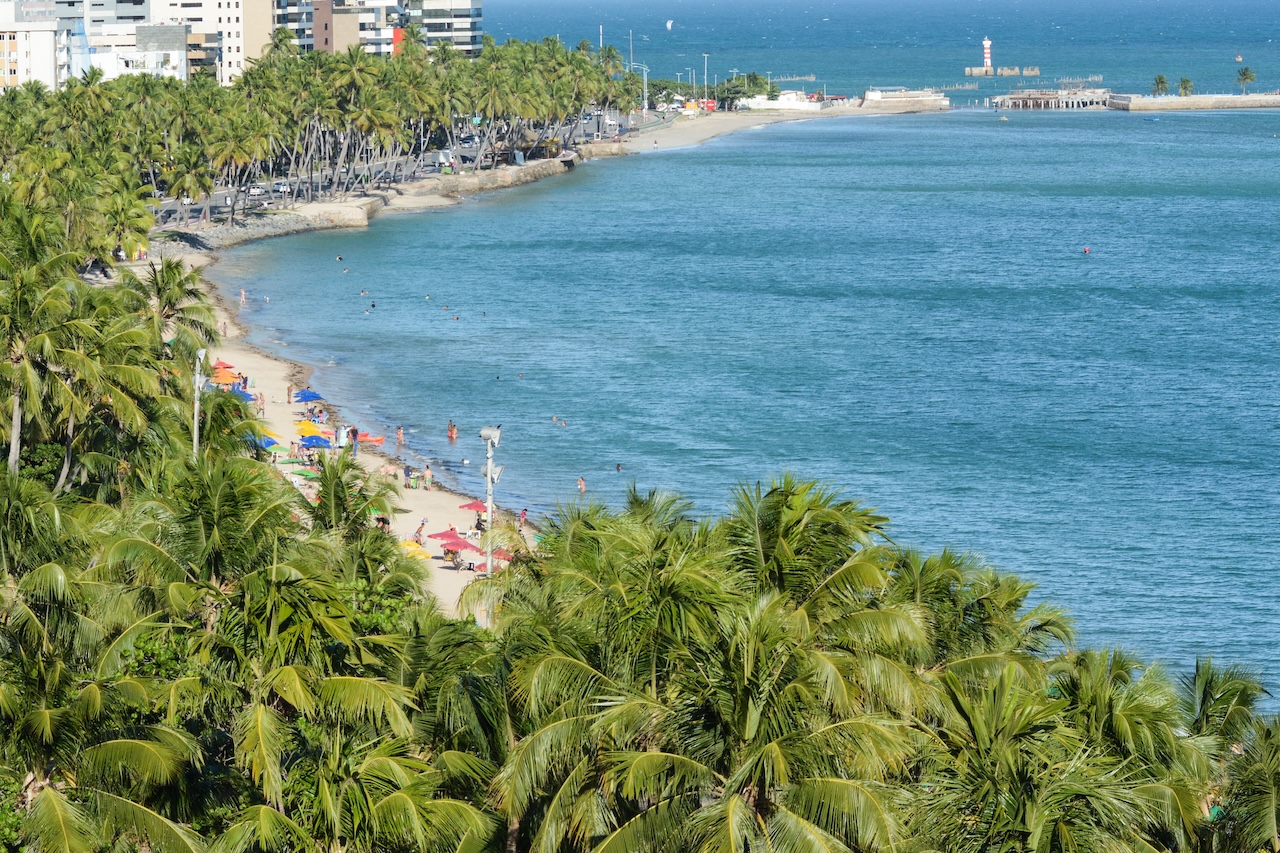Maceió - AL
Basic Information
- Population: 957,916 people
- GDP per capita: R$ 22,307.05
- Human Development Index (IDHM): 0.721
- Source: IBGE
Maceió is the capital of the state of Alagoas, in the northeast of the country. People born in Alagoas are Alagoano. Those born in Maceió are Maceioense. Maceió, nestled among the beautiful beaches of northeastern Brazil, captivates with its crystal-clear waters and coconut groves as far as the eye can see. In addition to its exuberant nature, the city breathes culture, expressed in its cuisine, music and festivals. Maceió's economy is driven by tourism, fishing and sugar cane production. The service sector, especially linked to tourist activities, is vital. The capital of Alagoas is a destination that mixes the modern and the traditional, offering visitors a unique experience. Maceió will host G20 technical meetings in Brazil in 2024.

Presentation
Maceió has a territorial area of 509,320 km2. The capital of the state of Alagoas is a diamond on Brazil's northeastern coast. With its rich history, diversified economy, vibrant culture, unique gastronomy and strategic importance, the city is among the most popular destinations in the Northeast.
Its beaches, such as Pajuçara, Ponta Verde and Jatiúca, are ideal for diving, raft trips and sunbathing. In addition, Maceió is a starting point for exploring other incredible destinations, such as the Ecological Route, with its natural pools in Maragogi, and the exuberant beauty of the Coral Coast.
Maceió's history dates back to the 17th century. Over the years, the city has experienced periods of prosperity and challenge. The Historic Center preserves buildings that tell this story, such as the Metropolitan Cathedral and the Théo Brandão Museum. The Jaraguá neighborhood, with its cobbled streets, is an architectural testimony to colonial influence.
The economy is diversified, driven by sectors such as tourism, fishing and agriculture. The city stands out as a commercial and cultural center in the Northeast. The capital of Alagoas also enchants visitors with its rich culture, manifested in popular festivals, such as São João, and in the regional cuisine, with delicious dishes based on seafood and local ingredients.
Maceió plays a crucial role in the regional and national context. Its strategic location on the northeastern coast makes it a vital logistical hub, connecting the northern and northeastern regions. The city also stands out as an educational and research center, with reputable institutions.
With so many options, Maceió stands out as a true paradise for lovers of tourism and nature.
Main tourist attractions:
• Pajuçara Beach
• Ponta Verde Beach
• Jatiúca Beach
• Praia do Francês
• Mirante São Gonçalo
• Feira de Artesanato da Pajuçara - Pajuçara Craft Fair
• Ipioca Beach
• Barra de São Miguel beach
• Mundaú Lagoon
24 HOURS IN MACEIÓ
MORNING
Start your journey at one of Maceió's most famous beaches, Pajuçara Beach. In addition to its stunning natural beauty, this beach is the starting point for raft trips to the natural pools. Board a raft and dive into the crystal-clear waters, where you'll see a variety of colorful fish and coral.
LUNCH
With its rich gastronomy, the city is full of interesting flavors. Try countless delicacies in the city's main restaurants. Some dishes stand out, such as chiclete de camarão, moqueca de frutos do mar, caldo de sururu and various dishes with carne de sol (sun-dried meat).
AFTERNOON
Explore the unspoiled natural beauty of Lagoa do Roteiro on an unforgettable boat trip. Sail through the calm waters of the lagoon, surrounded by mangroves and lush vegetation, and spot a variety of birds and wildlife. Take the opportunity to stop for a dip in the warm, crystal-clear waters.
LATE AFTERNOON
Head to Praia do Francês, known for its calm waters and white sands. As well as relaxing by the sea, take the opportunity to visit the Mirante do Gunga, from where you can enjoy a spectacular panoramic view of the Maceió coastline. There you can also practice activities such as surfing, stand-up paddle or simply relax in the sun.
NIGHT
Maceió's nightlife and attractions do not disappoint. As night falls early, it starts to get dark around 4pm and by 5pm it's already dark. Because of this, it's a good idea to plan your waking up and going out times well in advance, as things tend to close at midnight.
SÃO JOÃO DO NORDESTE
In Brazil, the month of June is marked by festivals celebrating some of the country's main June saints, such as Santo Antônio (St. Anthony), São Pedro (St. Peter), São João (St. John) and São Paulo (St. Paul). For those who want to experience a typical June festival, there is a program of festivities in the main cities of the Northeast region that take place in the second half of the month. The event includes traditional decorations, delicious typical food and lively quadrilhas, a traditional dance of the June festivities. You can also dance a lot of forró, a popular dance typical of the Northeast region, and eat various dishes made from corn, such as pamonha and canjica.
Airport
The Zumbi dos Palmares International Airport in Maceió plays a crucial role in regional integration, driving economic development and tourism. Its infrastructure strengthens commercial and cultural ties in the region.
Sites
Government of the State of Alagoas
G20 events in Maceió
Click here to see the full calendar